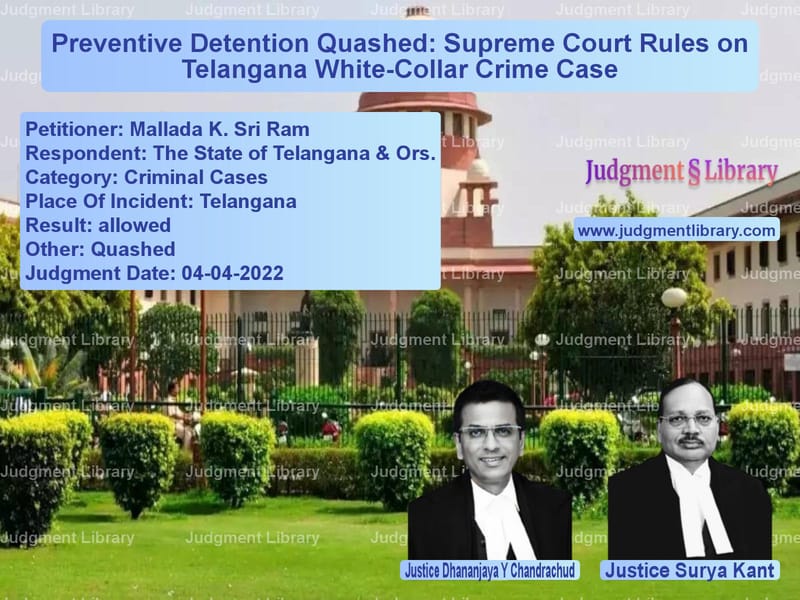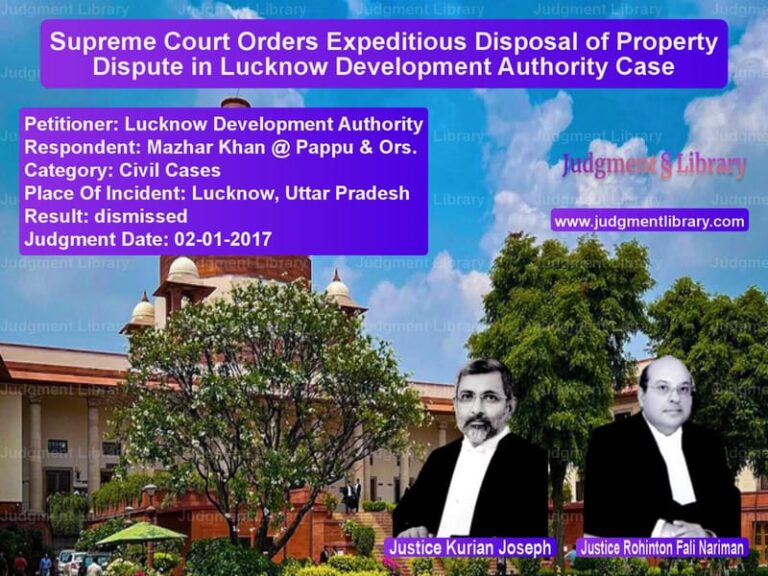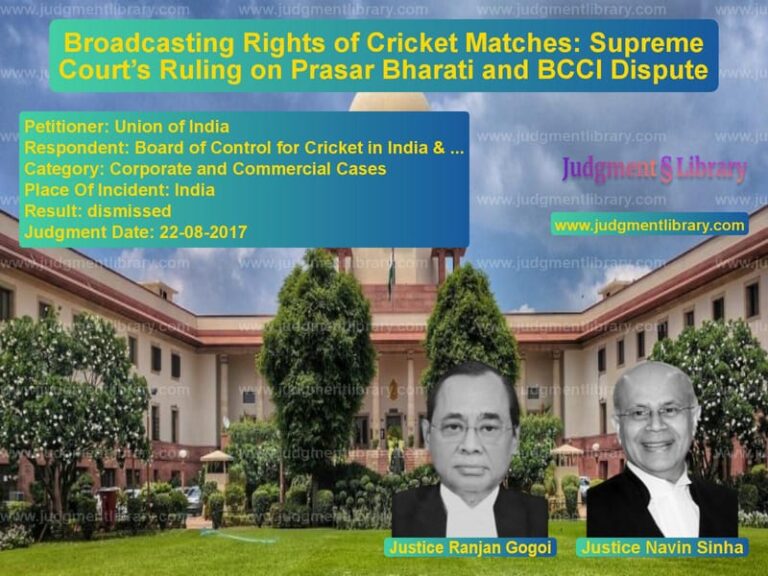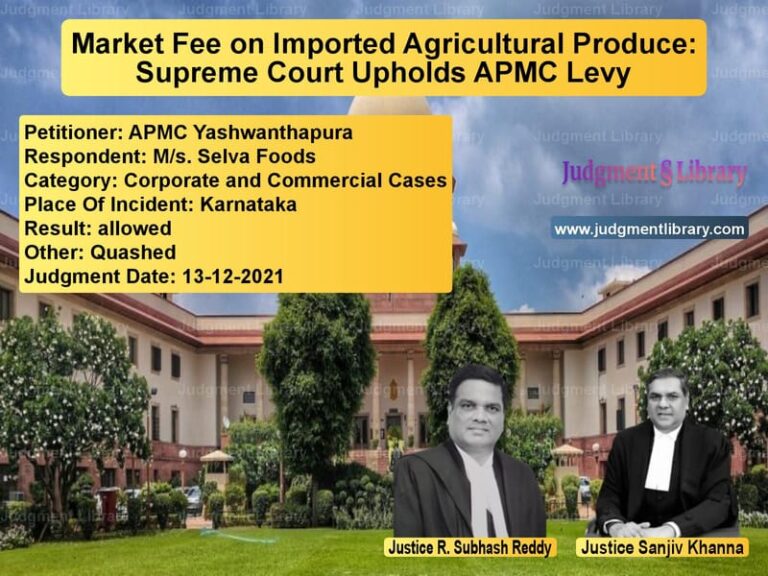Preventive Detention Quashed: Supreme Court Rules on Telangana White-Collar Crime Case
The Supreme Court of India recently ruled in the case of Mallada K. Sri Ram vs. The State of Telangana & Ors., addressing the legality of preventive detention under the Telangana Prevention of Dangerous Activities Act, 1986. The case revolved around allegations of financial fraud and whether the state could use preventive detention laws to incarcerate the accused when regular criminal proceedings were already underway.
Background of the Case
The appellant, Mallada K. Sri Ram, was accused of being involved in a job fraud scheme. He, along with others, allegedly collected Rs. 85 lakhs from 450 job aspirants by promising them employment. The police registered two First Information Reports (FIRs) against him:
- FIR No. 675 of 2020 at Banjara Hills Police Station for criminal breach of trust, cheating, criminal intimidation, and conspiracy under Sections 408, 420, 506, and 120B of the Indian Penal Code (IPC).
- FIR No. 343 of 2020 at Chatrinaka Police Station with similar allegations.
The appellant was arrested and later granted bail in both cases. However, on May 19, 2021, the Telangana government issued a preventive detention order against him under Section 3(2) of the Telangana Prevention of Dangerous Activities Act, 1986, classifying him as a “White Collar Offender” who posed a threat to public order.
The appellant challenged the detention order before the Telangana High Court, which dismissed his petition. He then approached the Supreme Court.
Legal Issues
- Whether preventive detention can be invoked when regular criminal law is sufficient to handle the alleged offenses.
- Whether a preventive detention order issued months after the alleged offense was justified.
- Whether the Telangana High Court erred in upholding the detention order.
Arguments by the Parties
Petitioner’s Arguments
- The appellant contended that the preventive detention order was issued seven months after the alleged offense and five months after he was granted bail.
- He argued that the Telangana Act of 1986 was misused, as financial fraud cases should be handled under ordinary criminal law and not preventive detention laws.
- He highlighted that the authorities never applied for cancellation of his bail but instead resorted to detention.
State of Telangana’s Arguments
- The State argued that the appellant’s fraudulent activities created “fear and panic” among job seekers, disrupting public order.
- They maintained that preventive detention was necessary to prevent him from engaging in similar activities.
- The government contended that white-collar crimes could also fall under “public order disturbances.”
Supreme Court’s Judgment
Key Observations
- The Court noted that preventive detention is an exceptional power and should be used only when ordinary criminal law is insufficient.
- It observed that the Telangana government failed to establish any imminent threat to public order justifying detention.
- It held that issuing the detention order months after the offense showed a lack of urgency, making it clear that it was not a preventive but a punitive action.
- The Court emphasized that authorities could have sought cancellation of bail if they believed the accused would re-offend.
Final Decision
The Supreme Court quashed the preventive detention order, ruling:
“Preventive detention cannot be used as a substitute for ordinary criminal law. There must be a real and imminent threat to public order, which is absent in this case.”
Implications of the Judgment
For Preventive Detention Laws
- The ruling limits the misuse of preventive detention laws for white-collar crimes.
- It clarifies that financial offenses should be dealt with under regular legal procedures.
For Individuals Accused in Criminal Cases
- The decision ensures that preventive detention cannot be misused to keep individuals incarcerated after they have secured bail.
- It reinforces the right to a fair trial and due process.
For State Governments
- States must show clear and urgent reasons before issuing preventive detention orders.
- The ruling sets a precedent preventing arbitrary use of preventive detention laws.
Conclusion
The Supreme Court’s ruling in Mallada K. Sri Ram vs. The State of Telangana is a landmark decision reinforcing that preventive detention must be used with caution. The Court’s strong stance against the misuse of detention laws ensures that citizens’ rights are protected and that ordinary legal processes are followed for criminal offenses. This judgment will serve as an important precedent in future cases involving preventive detention in white-collar crimes.
Petitioner Name: Mallada K. Sri Ram.Respondent Name: The State of Telangana & Ors..Judgment By: Justice Dhananjaya Y Chandrachud, Justice Surya Kant.Place Of Incident: Telangana.Judgment Date: 04-04-2022.
Don’t miss out on the full details! Download the complete judgment in PDF format below and gain valuable insights instantly!
Download Judgment: mallada-k.-sri-ram-vs-the-state-of-telanga-supreme-court-of-india-judgment-dated-04-04-2022.pdf
Directly Download Judgment: Directly download this Judgment
See all petitions in Bail and Anticipatory Bail
See all petitions in Money Laundering Cases
See all petitions in Fraud and Forgery
See all petitions in Judgment by Dhananjaya Y Chandrachud
See all petitions in Judgment by Surya Kant
See all petitions in allowed
See all petitions in Quashed
See all petitions in supreme court of India judgments April 2022
See all petitions in 2022 judgments
See all posts in Criminal Cases Category
See all allowed petitions in Criminal Cases Category
See all Dismissed petitions in Criminal Cases Category
See all partially allowed petitions in Criminal Cases Category







